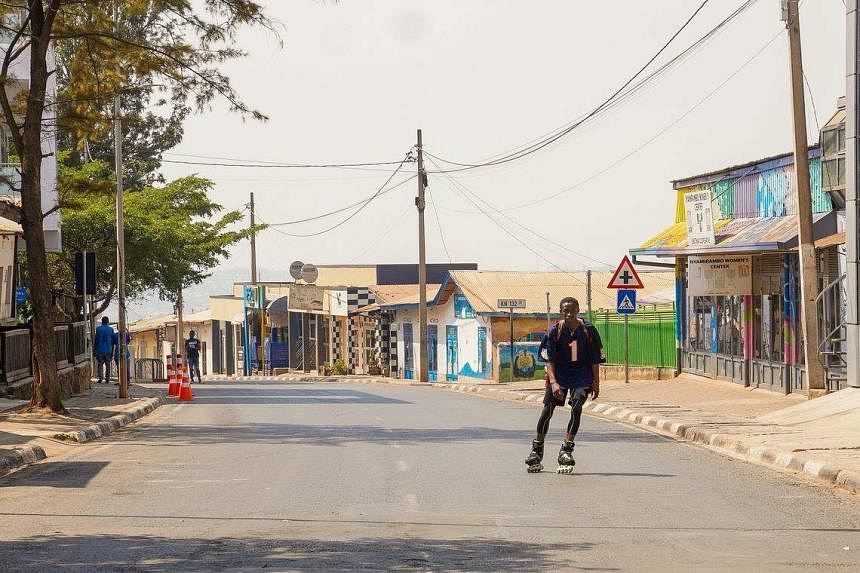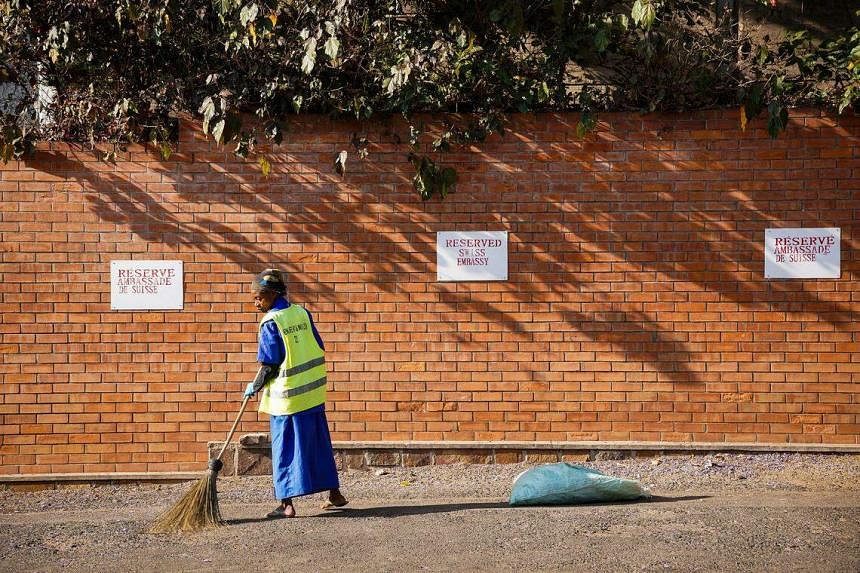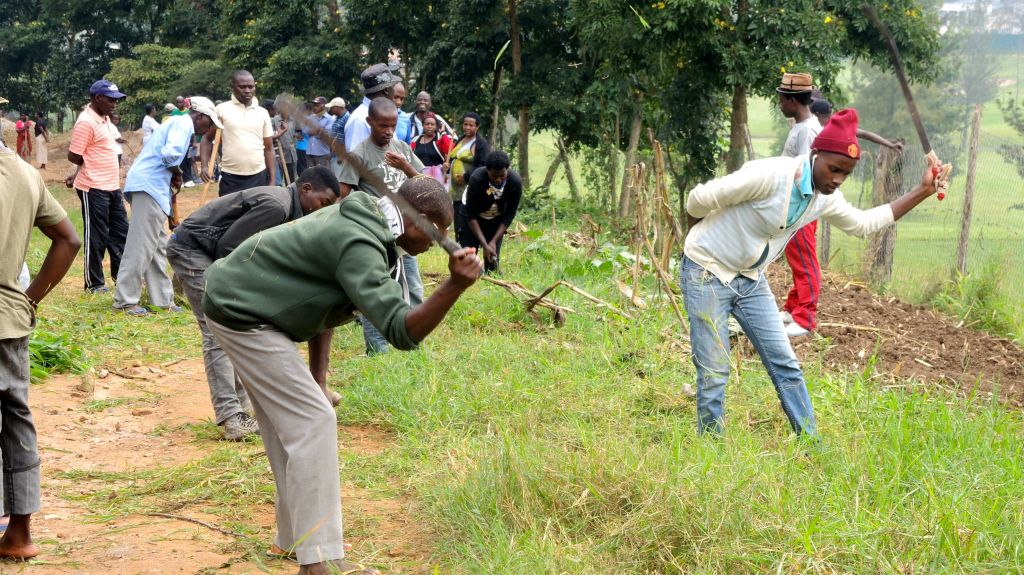KIGALI – In 2018, the head of the United Nations Environment Programme, Mr Eric Solheim, called the Rwandan capital, Kigali, the “cleanest city on the planet” for the lack of rubbish on its streets and its green initiatives.
And in 2022, travel blogger Drew Binsky – who has been to all 197 countries in the world – ranked Rwanda as the cleanest country in the world, ahead of Singapore.
The Rwandan government takes the country’s upkeep a step further by involving its citizens in a community work day known as Umuganda.
Umuganda takes place on the last Saturday of every month, from 8am to 11am. During this time, all able-bodied Rwandans aged 18 to 65 participate in mandatory community improvement projects, including cleaning the streets, repairing public facilities and building homes for the vulnerable.
The director-general of the Ministry of Local Government (Minaloc), Mr Richard Kubana, 41, said the main purpose of Umuganda is to resolve community issues such as infrastructure maintenance. “We conduct Umuganda to solve these issues without investing money. We use our resources and our people.”
Minaloc coordinates all Umuganda-related activities in Rwanda, which has four provinces and the city of Kigali.
Umuganda translates to “togetherness for common purpose”, said Dr Ismael Buchanan, 47, a lecturer at the University of Rwanda’s Department of Political Science and International Relations.
The initiative began in 1962 when Rwanda gained independence and became a weekly government programme in 1974.
After the 1994 genocide targeting the Tutsis, the government reintroduced Umuganda to Rwandan life to rebuild the nation and nurture a shared national identity, said Dr Buchanan.
Cells at work
At the Nyamirambo sector in Kigali, all activity came to a standstill on the morning of Umuganda.
A man in a safety vest roamed the empty streets with a megaphone, blaring instructions at the start of Umuganda. Rwandans ambled out of their homes with rakes and cloth sacks as they headed towards their designated areas.
Mr Kariannda Hadjei, 47, surveyed the action and greeted the villagers. As the chief of the Biryogo neighbourhood, he oversees all Umuganda efforts in the village.
“Umuganda is needed for the development of the country. It is an obligation and responsibility to Rwanda,” said Mr Hadjei.
He said Rwandan law states that anyone who skips Umuganda without a valid reason is liable to be fined 5,000 Rwandan francs (RWF) (S$5.70).

Umuganda is done within the umudugudu – an administrative structure known as a cell. Each cell consists of several villages.
The umudugudu is part of a larger system of administration in Kigali. The city comprises three districts divided into 35 sectors. Within these sectors, there are a total of 161 cells.
“We conduct Umuganda at a cell and village level because everyone knows each other. Then it is very easy to identify who is not present,” said Mr Kubana.
Student Ramadhan Uwase, 23, worked with the villagers from Biryogo to gather rubbish around the village. The rubbish was collected from an open field by a garbage truck after Umuganda.
“Umuganda is a simple act. It is not too difficult to do,” he said.
Mr Mohammad Nsenguyumva, 25, a barista at Fadhar Coffee Brewers, was responsible for cleaning the premises and the area outside the cafe. He noted that Rwanda is the only African country with an initiative like Umuganda.

Mr Nsenguyumva lauded President Paul Kagame for making the country clean: “Kagame is the special one. For us, he is the best in Africa.”
Beyond maintaining cleanliness, Umuganda is a time for citizens to settle disputes and bond with one another, said village leader Gartete Ahanedy, 50.
At the Mudugudu village, Mr Ahanedy led a post-Umuganda debrief where he made announcements and mediated disagreements among the villagers.
“If there are any problems, we discuss them here. Then we don’t need to write to the government and wait for them to help,” he added.
After the community work and meetings, the villagers celebrated over food and drinks.
A work in progress
While Umuganda has contributed to Rwanda’s cleanliness, getting young people on board is sometimes challenging.
Store owner Blush Godson, 22, said many of his friends skip Umuganda because they work several jobs and want to rest on the weekend.
“Interest in Umuganda slowed down a lot, especially after the pandemic. Life has become very hard,” he added.
Ms Izihire Kellya, 26, is another young person who does not take part in Umuganda activities. “For the younger generation, the cell group leaders don’t mind if we never participate,” she said, adding that she needs a break on her day off.
The laundromat attendant said that as it is, she pays the government a monthly public cleaning fee of 10,000 RWF. Businesses in Rwanda pay between 500 RWF and 10,000 RWF a month for street cleaning as part of their tax contributions.
“It doesn’t really matter if we don’t do it (Umuganda) as other people are already paid to clean the rest of the time,” said Ms Kellya.
And while non-participation draws a fine, village leaders do not always enforce such penalties.
The leaders of Mudugudu village prefer to encourage residents to participate in Umuganda rather than fining them, said civil servant Amani Munyarubega, 27.
He added that his approach is to “teach them and make them understand that it is their responsibility to help the community, instead of punishing them”.
Mr Kubana acknowledged it is not ideal when youth skip Umuganda: “If we cannot mobilise our people to participate in such activities related to community engagement, it is a failure. But we are trying our best.”
It is not because young people are not interested in community service, but that they have not been adequately encouraged to take part, he said.
Minaloc said it ensures that 80 to 90 per cent of youth attend Umuganda. According to the Rwanda Governance Scorecard for 2022, 97.3 per cent of citizens participated in Umuganda.
“We don’t even need to fine them or to punish them. The approach that we are using now is just mobilisation and to try to teach them the importance of volunteerism,” added Mr Kubana.
Source : The Straits Times

